Obtaining
Obtaining refers to the process of acquiring or gaining something, such as knowledge, materials, or resources. In the context of science, obtaining can refer to the collection of data, specimens, or experimental results for analysis and study.
Methods of Obtaining in Science
In science, there are various methods used to obtain information, materials, and data for research and study. Some common methods include:
- Observation: This involves using the senses to gather information about the natural world. It can be done directly, by watching and recording events, or indirectly, by using instruments and tools to measure and collect data.
- Experimentation: Experiments are designed to test hypotheses and gather data. They often involve manipulating variables and observing the effects to obtain insights into natural processes and phenomena.
- Research: This involves using existing sources of information, such as books, articles, and databases, to gather data and knowledge related to a specific topic or question.
- Sampling: Sampling involves selecting a representative subset of a larger population or group for study and analysis. It is commonly used in fields such as ecology, biology, and social sciences.
- Data Collection: This involves gathering and recording information and measurements from experiments, surveys, or other sources to support scientific study and analysis.
Study Guide for Obtaining in Science
Here are some key points to remember when studying the topic of obtaining in science:
- Understand the different methods of obtaining information and data in science, and be able to provide examples of each method.
- Recognize the importance of accurate and reliable data collection in scientific research and experimentation.
- Be familiar with the tools and instruments used for obtaining information and measurements in various scientific fields.
- Understand the ethical considerations and guidelines for obtaining data from human subjects and animal specimens in scientific research.
- Be able to explain how the process of obtaining is integral to the scientific method and the advancement of knowledge in the natural and social sciences.
By mastering the concept of obtaining in science, you will develop a deeper understanding of how knowledge is acquired and applied in scientific inquiry and discovery.
.◂Science Worksheets and Study Guides Fifth Grade. Plant Responses and Adaptations
Study Guide Plant Responses and Adaptations
Plant Responses and Adaptations  Activity Lesson
Activity Lesson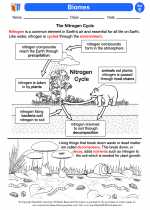 Biomes
Biomes  Worksheet/Answer key
Worksheet/Answer key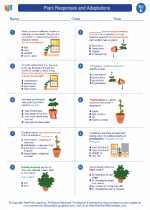 Plant Responses and Adaptations
Plant Responses and Adaptations  Worksheet/Answer key
Worksheet/Answer key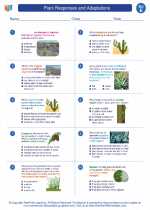 Plant Responses and Adaptations
Plant Responses and Adaptations  Worksheet/Answer key
Worksheet/Answer key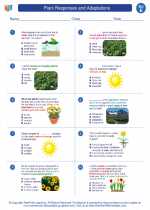 Plant Responses and Adaptations
Plant Responses and Adaptations  Vocabulary/Answer key
Vocabulary/Answer key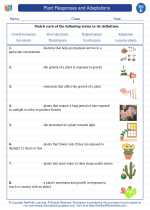 Plant Responses and Adaptations
Plant Responses and Adaptations  Vocabulary/Answer key
Vocabulary/Answer key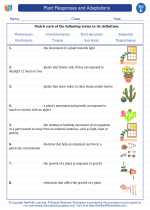 Plant Responses and Adaptations
Plant Responses and Adaptations 

 Activity Lesson
Activity Lesson
 Worksheet/Answer key
Worksheet/Answer key
 Worksheet/Answer key
Worksheet/Answer key
 Worksheet/Answer key
Worksheet/Answer key
 Vocabulary/Answer key
Vocabulary/Answer key
 Vocabulary/Answer key
Vocabulary/Answer key

The resources above cover the following skills:
Life Science
Interdependence - A. Plants and animals, including humans, interact with and depend upon each other and their environment to satisfy their basic needs. B. Both human activities and natural events can have major impacts on the environment. C. Energy flows from the sun through producers to consumers.
Compare and contrast adaptations displayed by animals and plants that enable them to survive in different environments such as life cycles variations, animal behaviors and physical characteristics.